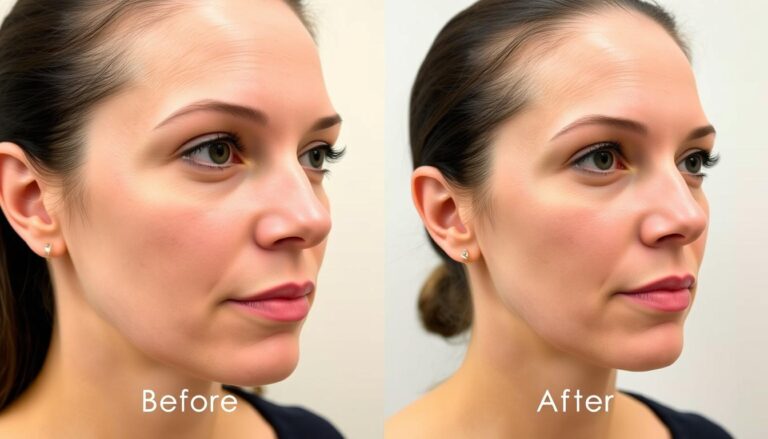Real Gastric Sleeve Transformations: Before & After

Did you know that people can lose between 30 to 110 lbs after gastric sleeve surgery? This huge weight loss shows how well the surgery works. It can even cut BMI by up to 18 points. For many, it’s not just about wearing smaller clothes. It’s about taking back their lives.
We will share amazing stories of people who got this surgery. Their journeys from before surgery to after show hope and strength. With help from doctors like Dr. Chen at UCLA, they found more energy and joy in simple things.
Let’s look at the amazing changes people have gone through with gastric sleeve surgery.
Table of Contents
What is Gastric Sleeve Surgery?
Gastric sleeve surgery is a popular choice for weight loss. It changes the stomach’s size and shape to reduce food intake. The surgery removes a big part of the stomach, leaving a banana-shaped one that holds only 20-25% of the original volume.
The procedure is done with small incisions, making recovery faster and scarring less. This makes it a good option for those looking to lose a lot of weight.
Overview of the Procedure
During the surgery, about 75-80% of the stomach is removed. This changes digestion and how we feel full. Surgical staplers and a Bougie tube help make the new stomach size precise.
The whole surgery is done through small openings in the abdomen. This keeps the damage to the area minimal.
How it Works
The surgery works by making the stomach smaller. This means you feel full after eating less. Hormonal changes also help reduce hunger.
Many people lose a lot of weight quickly. For example, some lose 80 pounds in six months. Others lose even more, like 90 pounds, by changing their lifestyle after surgery.
Expected Outcomes
People usually lose a lot of weight and see health improvements. Many reach their goal weight within a year. They also keep a healthy BMI.
Reviews from those who had the surgery are very positive. They often give it more than five stars. This shows how well the surgery can improve someone’s life.
Who Needs Gastric Sleeve Surgery?
Gastric sleeve surgery helps people who can’t lose weight with other methods. To qualify, you must meet certain criteria. These criteria show if the surgery will greatly help you.
Ideal Candidates
People with a BMI over 40 often qualify. Those with a BMI between 35 and 40 and health issues like diabetes or high blood pressure also qualify. This surgery is not just for weight loss. It also helps with serious health problems linked to obesity.
Health Considerations
Before surgery, your health is thoroughly checked. Gastric sleeve surgery can lead to losing 50 to 90 pounds. It may also help with conditions like high blood pressure and sleep apnea. But, there are risks like infection and nutrient deficiencies to think about.
Emotional and Psychological Factors
Getting ready for surgery means being emotionally and mentally ready. Candidates need to be mentally stable and ready for big lifestyle changes. Having support from loved ones and counseling can help a lot.
For those dealing with issues like erectile dysfunction, there are resources available. You can find more information on the topic. Getting the right help and treatment plans is key to improving your health.
The Gastric Sleeve Procedure
The gastric sleeve surgery is a big step towards lasting weight loss. It’s important for those thinking about it to know the steps involved. Getting ready for surgery is key to a successful outcome and easy recovery. Here’s what you need to know about getting ready, the surgery itself, and what to expect after.
Pre-Operative Preparation
Getting ready for gastric sleeve surgery means a lot of checks. Patients usually get:
- Physical exams to check their health.
- Nutrition advice to get them ready.
- Medical tests for any health issues.
These steps help doctors find any risks. They can then make a plan just for you.
The Surgical Process
The surgery is done with small cuts. Surgeons make two to five small cuts in your belly, each about 2-3 cm. It takes 60 to 90 minutes. They remove up to 75% of your stomach, making it look like a banana.
This change helps you eat less and feel less hungry. It’s because of the hormone ghrelin.
Recovery Timeframe
Recovery time varies for everyone. Usually, you’ll stay in the hospital for three nights after surgery. You can go back to work in a couple of weeks.
At first, you’ll eat only clear liquids for a week. Then, you’ll move to full liquids for two weeks. After that, you’ll start eating soft foods by week three. It’s important to watch your progress. You can lose 60 to 70% of your extra weight in 12 to 18 months.
Pre-Treatment Care for Gastric Sleeve
Getting ready for gastric sleeve surgery is a big step. It involves changing your diet, getting medical checks, and mental health assessments. Each part is key to making sure you’re ready for surgery and will do well afterward.
Dietary Modifications
Changing your diet before surgery is very important. You need to eat more protein and fewer calories to shrink your liver and lower surgery risks. Eating 60 to 70 grams of protein a day and staying under 800 calories helps with weight loss.
Also, drinking lots of liquid two weeks before surgery is a must. This gets your body ready for the big changes coming.
- Aim for 60-70 grams of protein daily.
- Drink at least 64 ounces of liquid each day.
- Follow a full liquid diet for approximately ten days before surgery.
- Consume smaller, more frequent meals after the operation.
Medical Evaluations
Medical checks are crucial to see if you’re a good candidate for surgery. These include blood tests, scans, and talks with specialists. They make sure the surgery is safe and will likely be successful.
Psychological Assessments
Surgery is not just about your body; it’s also a mental journey. Mental health checks make sure you understand what’s ahead and have the right mindset. Talking to a mental health expert helps you get ready emotionally.
It’s important to stay motivated after surgery. About 90% of success depends on how well you stick to your new habits.
Before and After Treatment Pictures
The journey to weight loss through gastric sleeve surgery is truly transformative. Many patients find visual proof to be a powerful motivator. Gastric sleeve before and after photos show the amazing changes people can see in a short time.
These images not only show physical changes but also the emotional victories of better health.
Real Patient Experiences
Patient stories show the big impacts of this surgery. For example, people have lost an average of 137 pounds. They also talk about better health, like less need for blood pressure and diabetes meds.
These stories are more than numbers; they’re about living a better life.
Visual Evidence of Transformation
Before and after pictures show the physical changes that inspire others. Patients talk about being able to exercise more and sleep better. These changes show how the surgery affects daily life.
Such visual proof is key in patient testimonials.
Inspiring Success Stories
Inspiring stories show the deep impact of gastric sleeve surgery. Many patients keep their weight off for over a year. They share their positive experiences, praising the service and support they received.
These stories, along with before and after photos, offer hope to those considering the surgery. They show the life-changing possibilities that await.
Post-Treatment Care and Guidelines
After gastric sleeve surgery, patients face big changes in their lifestyle. These changes are key for recovery and keeping weight off. Proper post gastric sleeve care helps people adjust well and stay healthy.
Dietary Restrictions after Surgery
Patients start with a liquid diet and move to solid foods later. The dietary guidelines after gastric sleeve say drink at least 64 ounces of fluids a day. They also need 60 to 100 grams of protein daily.
It’s important to avoid foods high in calories, sugar, and carbs. This helps with lasting weight loss.
Importance of Follow-Up Appointments
Following up after gastric sleeve is key for checking long-term effects and handling any issues. Regular visits to a bariatric specialist are important. They help adjust diets and medications.
Places like the UCSF Bariatric Surgery Center offer great support. They have dietitians and support groups. These visits help with both physical and emotional challenges after surgery.
Exercise Recommendations
Adding exercise to daily routines helps with recovery and keeping weight off. Patients should do moderate exercise for 30 to 45 minutes, three to five times a week. This boosts fitness, energy, and helps with any discomfort.
Following these exercise tips is crucial for lasting results and good health.
Risks and Complications of Gastric Sleeve
Gastric sleeve surgery is effective for many, but it has risks and complications. Knowing these risks of gastric sleeve surgery is key for making informed choices. Being aware of possible outcomes helps prepare and ensures safety during the process.
Common Risks
The surgery removes about 80% of the stomach, leaving a tube-like organ. It usually lasts 1 to 2 hours and has a short hospital stay. However, several potential complications of gastric sleeve surgery can happen:
- Excessive bleeding
- Infections
- Adverse reactions to anesthesia
- Blood clots
- Leaks from staple lines
Leaks from the stomach cut edge occur in about 1 to 2 in 100 cases. This can lead to serious conditions like sepsis.
Long-term Complications
After surgery, patients may face long-term issues, such as:
- Gastrointestinal blockage
- Hernias
- Gastroesophageal reflux
- Malnutrition and low blood sugar
- Psychological challenges, including depression and mood changes
Many patients lose around 60% of excess weight in two years. However, weight regain can happen if lifestyle changes are not kept up. This shows the importance of long-term commitment to healthy habits.
Importance of Risk Assessment
Thorough pre-operative assessments help evaluate individual understanding surgical risks. This prepares patients well. With a mortality rate of less than 1 in 1000, managing risks can greatly reduce complications and improve outcomes. Working with trusted healthcare providers is crucial for navigating these risks.
For more information on supporting your recovery, consider exploring options for knee braces that may be beneficial for physical support during your journey.
Products to Consider Pre and Post Treatment
After surgery, eating the right foods is key for recovery and keeping weight off. Choosing the right gastric sleeve nutrition products is important. Meal replacements and cookbooks can help you adjust to your new diet.
Nutritional Supplements
Patients often need supplements to fill dietary gaps after surgery. Here are some good options:
- BariMelts Bariatric Multivitamin: A post-op vitamin supply that ensures you get essential nutrients. It is priced at $26.99 for a one-month supply.
- Viactiv Calcium + Vitamin D3 Soft Chews: These caramel-flavored chews support bone health and retail for $10.31.
- Isopure Creamy Vanilla Whey Isolate Protein Powder: With 25g of protein and Keto-friendly, it is priced at $26.94.
Meal Replacement Products
Choosing meal replacements can help with weight loss and ensure you get enough nutrients. Here are some good choices:
- Premier Protein Shake: Offers 30g of protein with just 1g of sugar and includes 24 vitamins and minerals, priced at $29.99 for a pack of 12 shakes.
- Freshware Meal Prep Containers: Vital for portion control, these containers are microwave and dishwasher safe, available for $12.99 for a 15-pack.
Recommended Cookbooks
Using the best cookbooks for post sleeve diet helps you make balanced meals. Look for cookbooks that offer:
- Low-calorie, nutrient-dense recipes
- Creative ways to incorporate protein
- Meal planning tips and strategies
Choose carefully before and after surgery. The right mix of supplements, meal replacements, and cookbooks can help you follow your new diet.
Alternative Treatments to Gastric Sleeve
Exploring alternatives to gastric sleeve surgery can be enlightening. The gastric sleeve helps many lose weight, but other methods offer unique benefits. It’s important to understand each option to make the best choice.
Gastric Bypass Overview
The gastric bypass, or Roux-en-Y, changes the digestive tract for more weight loss. It creates a small stomach pouch and reroutes the intestines. This can lead to significant weight loss in the first six months.
Compared to gastric sleeve, gastric bypass often results in better long-term weight loss. It also improves health issues linked to obesity.
Adjustable Gastric Banding
Adjustable gastric banding is another surgical choice. It involves placing a band around the stomach’s upper part, making a smaller pouch. This method is less invasive than gastric bypass and sleeve gastrectomy.
The band’s adjustable feature allows for personalization. While weight loss may be slower, it has fewer risks and complications. This makes it attractive to some.
Non-Surgical Weight Loss Options
Not everyone needs surgery for weight loss. Non-surgical options are vital for those who may not qualify for surgery or prefer to avoid it. Options like endoscopic sleeve gastroplasty and the AspireAssist device are gaining popularity.
Endoscopic procedures offer significant weight loss without the risks of traditional surgery. A tailored plan of lifestyle changes, diet, and medical advice can also lead to success.
Cost of Gastric Sleeve Surgery
The cost of gastric sleeve surgery is a big factor for people considering it. Knowing the cost and what’s included helps them make informed choices. This part talks about the average costs in the U.S., what affects prices, and insurance options.
Average Surgical Costs in the U.S.
In the U.S., gastric sleeve surgery costs between $15,067 and $38,045. These prices vary based on the type of surgery. Here are some examples:
- Laparoscopic sleeve gastrectomy (LSG): averages around $19,459, with costs ranging from $15,067 to $37,103.
- Endoscopic sleeve gastroplasty (ESG): averaging $19,575, with a range of $15,256 to $38,045.
Prices also differ by state. The District of Columbia has the highest cost at about $25,405. Arkansas has the lowest at around $16,532. It’s key to look into local costs and prices.
Factors Influencing the Price
Several things can change the cost of gastric sleeve surgery. These include:
- Surgeon’s expertise and reputation
- Hospital or surgical facility fees
- Location of the procedure
- The patient’s overall health status and any necessary pre-operative evaluations
Knowing these factors helps patients plan their budget better.
Insurance Coverage
Insurance for gastric sleeve surgery varies a lot. Many plans cover it if certain criteria are met. This includes a BMI of 40 or higher, or a lower BMI with obesity-related health issues. It’s crucial to check policy details and medical necessity before surgery.
In summary, understanding the costs and insurance for gastric sleeve surgery is key. A good budget and knowledge of financial aid can make the process easier. This helps patients on their journey to this life-changing surgery.
Finding Gastric Sleeve Treatment Near You
Starting your gastric sleeve surgery journey is a big step. It involves finding a good surgeon and a reputable clinic. Looking into a surgeon’s credentials and experience is key. Also, reading reviews can give you a better idea of what to expect.
Locating Qualified Surgeons
Begin by searching online for certified surgeons in your area. Look for those who work at respected hospitals or clinics. Check their education, certifications, and experience in bariatric surgery. Some clinics even share their surgeons’ success rates and patient feedback.
Researching Accredited Facilities
Choosing an accredited clinic is important for your safety. Accreditation means the clinic meets high standards for care. You can check if a clinic is accredited through The Joint Commission or the American College of Surgeons. Make sure the clinic offers full support before and after surgery for a better experience.
Patient Reviews and Recommendations
What others say about their surgery is very helpful. Look for forums or websites where people share their gastric sleeve experiences. Reviews can tell you about recovery times, staff professionalism, and overall satisfaction. This information can help you make a more informed choice.
Preparing for Gastric Sleeve Surgery
Getting ready for gastric sleeve surgery needs careful planning. Knowing about the surgery and its effects can make your experience better. Talking to your surgeon can clear up any doubts you have.
Having a strong support system is key for recovery and staying motivated. It’s also important to have realistic goals for after the surgery. This helps you adjust smoothly to life after the operation.
Questions to Ask Your Surgeon
It’s crucial to ask your surgeon key questions before the surgery. Here are some important ones:
- What are the specific benefits and risks associated with gastric sleeve surgery?
- What should I expect during the recovery period?
- How can I prepare nutritionally before the surgery?
- What lifestyle changes will I need to make post-surgery?
- Will I have access to a multidisciplinary care team for support?
These questions for gastric sleeve surgeon give you a better idea of what’s to come.
Creating a Support System
Building a strong support system means finding people who support your goals. Friends, family, or community members can offer emotional support and help with daily tasks. Joining support groups for bariatric patients can also be helpful.
These groups share experiences, offer advice, and keep you motivated. They understand what you’re going through.
Setting Realistic Expectations
It’s important to set goals that are within reach when preparing for gastric sleeve. Remember, changes take time and effort. Weight loss varies from person to person.
Focus on health goals rather than just weight loss. This mindset makes the journey more rewarding. It’s about living a healthier life, not just losing weight.
Managing Physical Changes After Surgery
After gastric sleeve surgery, you’ll notice big changes in your body. It’s important to understand these changes to recover well. Adjusting to physical and emotional changes helps a lot.
Understanding Body Changes
After surgery, your stomach is much smaller. You’ll need to eat differently, focusing on protein and less carbs. This helps your body heal and adjust to the new stomach size.
Slow weight loss is good for your health. It’s key to plan your diet for the long term. Keeping track of your progress helps you stay on the right path to a healthier life.
Coping with Emotional Adjustments
Weight loss surgery also brings emotional changes. You might feel excited, anxious, or even regretful. It’s important to recognize these feelings.
Looking for ways to deal with these emotions is crucial. Journaling or talking to a therapist can help. Sharing your feelings with others can also support your growth during this time.
Importance of Support Groups
Meeting others who have gone through similar experiences is very helpful. Support groups for gastric sleeve patients offer a place to share and learn. They help you find ways to cope and feel supported.
Being part of these groups creates a sense of community. It helps fight feelings of loneliness during the recovery process.
| Support Group Benefits | Description |
|---|---|
| Shared Experiences | Members can relate and offer insights based on personal journeys. |
| Emotional Support | Encouragement from peers helps cope with emotional changes after weight loss surgery. |
| Accountability | Group members motivate each other to stay on track with their health goals. |
| Access to Resources | Members can share helpful information about diets, exercises, and recovery. |
Importance of Lifestyle Changes Post-Surgery
The journey after gastric sleeve surgery requires big changes in lifestyle. New habits are key to keeping weight off long-term. A good plan includes diet changes, exercise, and mental health support.
Long-Term Dietary Changes
Patients should focus on lasting diet changes for better health. Aim for 60-80 grams of protein daily. Taking multivitamins and calcium supplements helps meet nutritional needs.
Slowly adding back regular, healthy foods after 12 weeks helps. Drinking at least 1.5 liters of fluids daily also boosts well-being.
Exercise Regimen After Surgery
Starting a regular exercise routine is crucial after surgery. Begin with short walks and simple activities early on. Aim for 60 minutes of moderate exercise daily, like walking or swimming.
After four months, you can do more intense activities. Regularly check your weight to track your progress.
Mental Health Considerations
Mental health is important after surgery. The change in weight can affect your mind. Seek support from family, friends, and counseling if needed.
Building strong relationships helps your emotional health. For more help, consider lifestyle coaching at the gym around four months.
| Aspect | Recommendation |
|---|---|
| Protein Intake | 60-80 grams per day |
| Fluids | At least 1.5 liters daily |
| Vitamins | Two Centrum multivitamins and calcium daily |
| Exercise Duration | Aim for 60 minutes daily |
| Early Exercise | Start with walking, swimming, aqua jogging |
| Diet Transition | Introduce regular foods after 12 weeks |
Tracking Your Progress After Gastric Sleeve
Starting a weight loss journey with gastric sleeve surgery is a big step towards a healthier life. After surgery, it’s key to track your progress to stay motivated. Tracking your weight loss journey helps you stay focused on your goals and keeps you proactive.
Setting Personal Goals
Setting clear goals is important for tracking your gastric sleeve progress. Start with short-term and long-term goals, like reaching a certain weight or improving health markers. Celebrating small wins keeps you motivated and makes every step count.
Keeping a Progress Journal
Keeping a journal of your journey is helpful. It tracks your food, exercise, and feelings. This helps you stay on track and encourages good habits. Apps like MyFitnessPal or Baritastic can also help, giving you insights into your progress.
Celebrating Milestones
When you hit milestones, like reaching a target weight or enjoying social activities, celebrate. Celebrating your successes keeps you positive and helps you maintain a healthy lifestyle. Every achievement, big or small, is worth celebrating on this journey.
FAQ
What is gastric sleeve surgery?
How much weight can I expect to lose after gastric sleeve surgery?
Who are the ideal candidates for gastric sleeve surgery?
What should I do to prepare for gastric sleeve surgery?
How risky is gastric sleeve surgery?
What kind of dietary changes will I need to make after surgery?
Can I use meal replacement products after surgery?
What alternative treatments exist for those not considering gastric sleeve surgery?
How much does gastric sleeve surgery typically cost?
How can I track my progress after gastric sleeve surgery?







